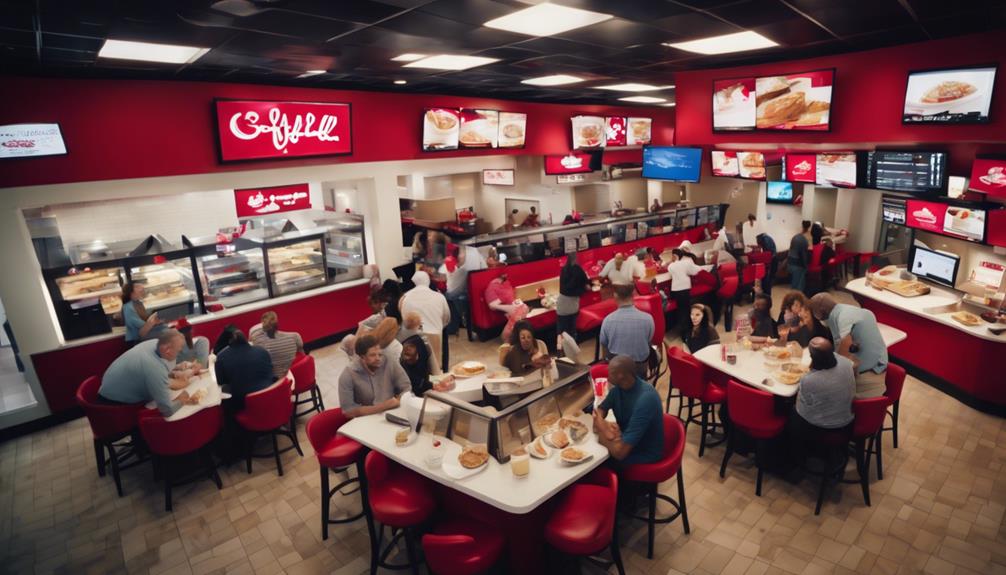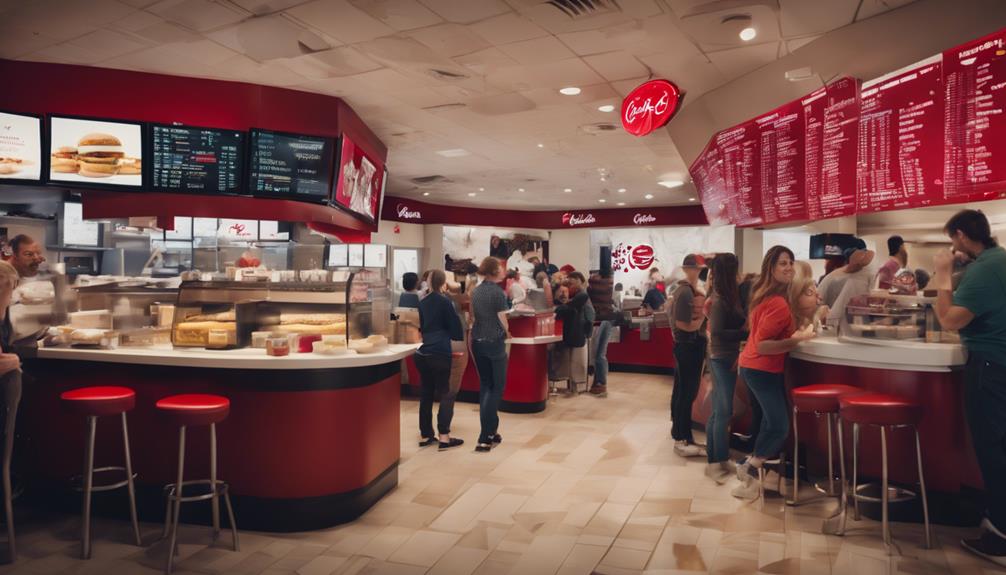Chick-fil-A's franchise model stands out due to its low entry costs and impressive revenue potential, averaging over $5 million per location. However, this enticing opportunity comes with unique challenges. Franchisees are limited to a single location, and resale is prohibited, which restricts their growth. Additionally, an ongoing sales percentage of around 15% can strain profitability. While the company guarantees extensive training and support, managing operational costs effectively remains vital. These factors create a complex landscape for franchisees, balancing potential income with stringent limitations. To understand the intricacies of this model, one can explore further insights and implications.
Key Elements

Chick-fil-A's franchise model includes essential components that shape its operations and appeal to potential franchisees. These components include a strong brand reputation, comprehensive training programs, ongoing support, and a proven business model. Chick-fil-A’s franchisees also benefit from a loyal customer base and a menu that has broad appeal. As a result, Chick-fil-A has consistently been ranked as one of the top franchise opportunities in the US. Explore franchise opportunities with Chick-fil-A to become a part of their successful and rewarding business model.
The company overview highlights its commitment to quality and customer service, while the business overview outlines the unique aspects of the franchise system.
Additionally, critical information for franchisees clarifies what to expect when joining this successful brand.
Company Overview
As a leading fast-food chain, Chick-fil-A is celebrated for its commitment to high-quality food and exceptional customer service.
Founded by Truett Cathy in 1946, the brand initially emerged with the Dwarf House restaurant, ultimately perfecting its iconic chicken sandwich in 1964.
The name Chick-fil-A signifies a dedication to grade A quality, utilizing simple ingredients like bread, chicken, butter, and pickles.
With an 80-year legacy, Chick-fil-A emphasizes a limited menu that guarantees consistent excellence.
The company's unique franchise model allows for low entry costs and profit sharing, yet restricts ownership to one location, posing challenges for potential investors.
Despite these limitations, Chick-fil-A continues to thrive as the highest-grossing fast-food chain globally, showcasing its effective business approach.
Business Overview
The business overview of Chick-fil-A highlights its unique franchise model, which combines low entry costs with a focus on high-quality food and exceptional customer service.
This model limits franchisees to operating a single location and prohibits resale, creating a distinct challenge for potential investors.
Despite these restrictions, Chick-fil-A has become the highest-grossing fast-food chain globally, with average revenues exceeding $5 million per location.
Its streamlined menu emphasizes core offerings, ensuring consistent quality.
The brand's commitment to exceptional customer experiences, embodied in its employee training and service ethos, sets industry standards.
With an impressive 80-year legacy, Chick-fil-A's focus on quality over quantity continues to inspire success among emerging chains in the fast-food sector.
Information for Franchisees
Franchisees seeking to join Chick-fil-A must navigate a unique model that emphasizes commitment to quality, limited ownership opportunities, and a focus on customer satisfaction.
Unlike typical franchises, Chick-fil-A restricts franchisees to one location, preventing resale of the business. This model allows for lower initial investment compared to other fast-food franchises, but it also limits growth potential.
Franchisees benefit from Chick-fil-A's strong brand reputation and extensive training programs, ensuring high standards in food quality and customer service. The company shares profits with franchisees, enabling financial success within set parameters.
Despite the limitations, many franchisees find fulfillment in the brand's mission, fostering a strong sense of community while delivering exceptional experiences to customers.
Company Overview

Chick-fil-A's foundation rests on Truett Cathy's vision, emphasizing quality food and exceptional service.
His guiding principles shaped a customer-focused culture that continues to define the brand today.
As the competitive landscape evolves, understanding Cathy's leadership legacy offers valuable insights into the franchise's success and enduring appeal.
Truett Cathy's Founding Vision
Founded by Truett Cathy in 1946, the vision for Chick-fil-A centered on delivering high-quality food and exceptional service, setting a foundation for the brand's enduring legacy.
Cathy's dedication to crafting the perfect chicken sandwich led to the creation of the Dwarf House restaurant, where he honed his recipes and customer approach.
In 1964, he launched Chick-fil-A, trademarking a name that symbolizes grade A quality. The original chicken sandwich featured simple yet quality ingredients—bread, chicken, butter, and pickles.
This focus on excellence established a strong brand identity, emphasizing customer satisfaction and quality over quantity.
Today, Chick-fil-A remains a reflection of Cathy's founding vision, consistently prioritizing the customer experience in a competitive fast-food landscape.
Truett Cathy's Guiding Principles
Truett Cathy's guiding principles emphasize quality, customer service, and a commitment to excellence that continues to shape the Chick-fil-A brand.
From the beginning, he prioritized a limited menu featuring high-quality ingredients, ensuring each item met his standards. Cathy's focus on exceptional customer service transformed the dining experience, fostering a culture where employees are trained to go above and beyond. The brand's mantra, 'My pleasure,' encapsulates this ethos, setting a benchmark in the fast-food industry.
Additionally, Cathy believed in strong community ties and ethical business practices, creating a loyal customer base. These principles not only define the Chick-fil-A experience but also serve as a roadmap for franchisees, guiding their operations and interactions with customers.
Truett Cathy's Leadership Legacy
A legacy of leadership and innovation defines the company, reflecting Truett Cathy's unwavering commitment to quality, service, and community engagement.
Cathy founded Chick-fil-A in 1946, emphasizing a simple yet effective menu centered around the chicken sandwich. His approach prioritized customer satisfaction and employee training, fostering a culture of excellence.
Under his guidance, the company cultivated an identity rooted in integrity and community involvement, establishing a brand that resonates with customers. The trademarked name Chick-fil-A embodies the promise of grade A quality, which has become synonymous with the brand.
Cathy's principles continue to influence Chick-fil-A's operations, ensuring that the company not only thrives as a business but also serves as a pillar of community support and ethical leadership.
Competitive Landscape Overview
Chick-fil-A stands out in the competitive fast-food landscape by focusing on its signature chicken sandwich and an unwavering commitment to quality and customer service. This unique approach has positioned Chick-fil-A as the highest-grossing fast-food chain globally, with average revenues exceeding $5 million per location.
The brand's emphasis on a limited menu enhances efficiency and maintains high food quality, setting it apart from competitors like McDonald's and Wendy's.
While its franchise model presents challenges, such as restricting ownership to one location and no resale opportunities, it also offers low entry costs and profit-sharing. This model fosters a dedicated workforce and strengthens customer loyalty, ensuring Chick-fil-A's continued growth and influence in the fast-food sector.
Brand Identity

Chick-fil-A builds its brand identity on a foundation of customer loyalty and trust, which stems from its commitment to quality service.
The franchise emphasizes exceptional employee training programs that reinforce its core values and enhance the customer experience.
This focus not only sets Chick-fil-A apart but also fosters a loyal customer base that appreciates the brand's dedication to excellence.
Customer Loyalty and Trust
Exceptional customer loyalty and trust stem from a brand identity that consistently prioritizes quality and service over mere profit.
Chick-fil-A cultivates an emotional connection with its customers, creating a sense of belonging and familiarity. This connection is evident in the brand's ability to maintain a loyal customer base despite controversies.
The 'My pleasure' motto reinforces a culture of warmth and attentiveness, further solidifying customer trust. By focusing on a limited menu and delivering exceptional food, the brand positions itself as a reliable choice.
This commitment to a clear mission resonates deeply with customers, fostering loyalty that extends beyond typical fast-food experiences. Ultimately, Chick-fil-A's brand identity is about nurturing relationships, ensuring customers feel valued and appreciated.
Commitment to Quality Service
A steadfast commitment to quality service reinforces the brand's identity, setting it apart in a competitive fast-food landscape.
Chick-fil-A excels by focusing on delivering not just food but an experience that emphasizes customer satisfaction. The phrase 'My pleasure' epitomizes this ethos, fostering a welcoming atmosphere that keeps patrons returning.
By prioritizing quick service and exceptional food quality, the brand establishes itself as a leader in service excellence. This dedication to core strengths, rather than diversifying its offerings, reflects a clear vision and mission.
As a result, Chick-fil-A sets industry standards, inspiring other chains to adopt similar approaches while maintaining its distinctive identity. This proves that consistency in service quality is integral to long-term success.
Exceptional Employee Training Programs
Investing in thorough employee training programs, the brand guarantees that each team member embodies its commitment to outstanding service and quality.
Chick-fil-A's training focuses on creating delightful customer experiences, ensuring staff understands the importance of their role in the brand's identity. With a strong emphasis on the phrase 'My pleasure,' employees learn to prioritize customer satisfaction in every interaction.
This rigorous training sets industry standards, reinforcing the company's reputation for exceptional service. By fostering a culture of excellence, Chick-fil-A empowers its team members to take ownership of their roles, leading to consistent execution of the brand's core values.
Ultimately, this focus on employee development drives Chick-fil-A's success and solidifies its place as a leader in the fast-food industry.
Information for Franchisees

Franchisees looking to join Chick-fil-A can expect a unique opportunity that combines low entry costs with a commitment to quality and service excellence.
The franchise offers a supportive environment, emphasizing strong operational guidelines and a focus on customer satisfaction. Franchisees receive extensive training and resources, ensuring they're well-prepared to uphold the brand's high standards.
The company's well-defined processes and systems streamline operations, making it easier for franchisees to manage their locations effectively.
Additionally, Chick-fil-A fosters a collaborative community among its franchisees, encouraging shared experiences and best practices.
This supportive network, along with a proven business model, sets franchisees up for success in a competitive fast-food landscape.
Financial Requirements & Ongoing Fees

Understanding the financial requirements and ongoing fees associated with a Chick-fil-A franchise is essential for prospective franchisees.
The model features a relatively low initial investment compared to other fast-food franchises, but it also includes various ongoing costs like royalty fees and marketing contributions.
These financial aspects greatly influence the overall profitability and sustainability of a Chick-fil-A location.
Startup Costs for Franchisees
Maneuvering the financial landscape of a Chick-fil-A franchise requires careful consideration of initial startup costs and ongoing fees that can impact profitability.
Franchisees face a modest initial investment compared to other fast-food chains, yet ongoing fees, including royalty payments and contributions to advertising funds, can add up considerably.
Additionally, franchisees must account for operational expenses, such as staffing, equipment, and supplies, all of which contribute to the overall financial commitment.
While Chick-fil-A's model offers low entry costs, the lack of business resale and limited growth potential means franchisees must be strategic in managing these expenses.
Understanding these financial dynamics is essential for aspiring franchise owners aiming for long-term success.
Initial Investment Requirement
Typically, the initial investment for a Chick-fil-A franchise is relatively low compared to other fast-food chains, making it an attractive option for aspiring entrepreneurs. Franchisees need to secure a minimum of $10,000 as a franchise fee, which is considerably less than many competitors.
However, this accessible entry point comes with unique financial requirements. Chick-fil-A maintains strict control over costs, often covering the expense of building and equipping the restaurant. Franchisees are responsible for operational costs and supplies, but the company's support helps mitigate financial burdens.
Additionally, Chick-fil-A requires franchisees to have liquid assets of at least $250,000, ensuring they can sustain operations during the initial growth phase. Overall, the investment structure presents both opportunities and challenges for potential franchisees.
Ongoing Percentage of Sales
Franchisees pay an ongoing percentage of sales to Chick-fil-A, which greatly influences their overall financial performance and operational budgeting. This fee typically hovers around 15%, notably impacting how franchisees manage their profits and expenses.
Unlike many franchise models that charge flat fees, this percentage-based approach aligns Chick-fil-A's success with that of its franchisees, fostering a partnership dynamic. Franchisees must meticulously plan their budgets, ensuring they account for this continuous financial obligation while working for profitability.
The requirement encourages franchisees to maximize sales and efficiency, directly tying their operational success to the brand's overall performance. As a result, franchisees often find themselves focused on driving customer satisfaction to boost sales and, consequently, their bottom line.
Marketing Contribution Requirements
In addition to the ongoing percentage of sales, Chick-fil-A franchisees are required to contribute a portion of their revenue toward marketing efforts to strengthen the brand's presence and drive customer engagement.
This marketing contribution is vital for maintaining Chick-fil-A's competitive edge in the fast-food industry. Typically, franchisees must allocate a specific percentage of their gross sales for marketing initiatives, which encompass national advertising campaigns, local promotions, and brand-building activities.
These contributions guarantee that franchisees benefit from a unified brand strategy, enhancing customer loyalty and attracting new patrons.
Royalty Fees and Operational Expenses
Royalty fees and operational expenses are critical financial requirements for Chick-fil-A franchisees, impacting their overall profitability and business management.
Franchisees pay a royalty fee of 15% of their sales, which covers the brand's marketing and operational support. While this fee may seem steep, it contributes to the franchise's successful, recognizable brand.
Additionally, franchisees must account for various operational expenses, including rent, utilities, and employee wages. These costs can add up quickly, often consuming a significant portion of their revenue.
Despite the financial demands, many franchisees remain committed to the Chick-fil-A model, as the potential for high sales volume often offsets the expenses.
Ultimately, effective financial management is essential for franchisees to thrive in this competitive market.
Financing Options

When considering Chick-fil-A's franchise model, financing options play a vital role in helping aspiring franchisees get started.
Various assistance programs, alternative funding sources, and government-backed loans are available to support their investment journey.
Understanding these financial avenues can greatly impact a franchisee's success and sustainability in the competitive fast-food landscape.
Franchisee Loan Assistance Options
Maneuvering the financial landscape for franchisees can be challenging, but various loan assistance options provide critical support for those looking to invest in a Chick-fil-A franchise.
Chick-fil-A franchisees can access several financing avenues, including traditional bank loans, Small Business Administration (SBA) loans, and specialized franchise financing. These options often feature competitive interest rates and favorable terms, making it easier for entrepreneurs to secure necessary capital.
Additionally, Chick-fil-A's corporate team offers guidance in steering through these financial resources, helping prospective franchisees identify the best fit for their situation.
Alternative Funding Sources Available
Exploring alternative funding sources can provide prospective Chick-fil-A franchisees with additional financial flexibility beyond traditional loans. Many franchisees turn to personal savings, tapping into retirement accounts or home equity lines of credit.
Crowdfunding platforms also present an innovative way to gather funds, enabling franchisees to attract small investments from friends, family, and even the community. Peer-to-peer lending has gained traction, offering competitive rates compared to banks.
Additionally, some franchisees explore partnerships with local businesses or investors who share their vision. These alternative options can help alleviate the financial burden of initial investments and ongoing operational costs, allowing franchisees to focus on building their Chick-fil-A locations while maintaining a healthy cash flow.
Government-Backed Loan Providers
For prospective Chick-fil-A franchisees seeking additional financing options, government-backed loan providers offer a viable route to secure funding with favorable terms.
These loans, often guaranteed by entities like the Small Business Administration (SBA), provide lower interest rates and extended repayment periods. Such financial support can help new franchisees cover initial costs, including equipment and inventory, while easing cash flow concerns during the critical startup phase.
Additionally, government-backed loans typically require less collateral, making them more accessible for individuals who may lack substantial personal assets.
Training & Support Offered

Chick-fil-A provides extensive training and support for its franchisees to guarantee success in their operations.
The thorough onboarding sessions equip new owners with the necessary skills, while regular workshops offer ongoing development.
Additionally, the franchise's operational and marketing assistance helps franchisees navigate the competitive fast-food landscape effectively.
Comprehensive Onboarding Training Sessions
Thorough onboarding training sessions set new franchise operators up for success by equipping them with the skills needed to deliver Chick-fil-A's renowned customer service and quality standards.
These sessions provide an extensive understanding of the brand's values, operational procedures, and expectations. New operators engage in hands-on training, learning everything from food preparation to customer interaction techniques.
They're also introduced to Chick-fil-A's unique culture, emphasizing teamwork and community involvement. By the end of the training, franchisees feel confident in their ability to manage their locations effectively.
This extensive approach guarantees that each franchise maintains the high standards that customers have come to expect, ultimately contributing to the brand's continued success and reputation in the fast-food industry.
Regular Skills Enhancement Workshops
Building on the foundation established during onboarding, regular skills enhancement workshops guarantee franchise operators continuously refine their abilities to uphold the brand's exceptional service and quality standards.
These workshops focus on various aspects, such as effective communication, customer engagement, and operational efficiency. By participating in these sessions, operators stay updated on best practices and emerging trends within the fast-food industry.
The workshops also foster a culture of teamwork and collaboration, enabling franchisees to share experiences and learn from one another. This ongoing support helps maintain Chick-fil-A's reputation for outstanding service while empowering franchise operators to lead their teams effectively.
Ultimately, these skills enhancement workshops play an essential role in sustaining the brand's commitment to excellence.
Operational and Marketing Assistance
Franchise operators receive extensive operational and marketing assistance, ensuring they effectively implement the brand's high standards and reach their target audience.
Chick-fil-A provides thorough training programs that cover everything from food preparation to customer service excellence. Operators benefit from ongoing support, including regular visits from corporate staff who offer insights and guidance tailored to individual locations.
Marketing resources, such as promotional materials and social media strategies, help franchisees engage with their communities and drive sales. Additionally, the brand's emphasis on strong customer service equips operators with the skills necessary to foster exceptional dining experiences.
This robust support system allows franchisees to maintain the quality and consistency that Chick-fil-A is known for, ultimately contributing to their success in the fast-food industry.
LEGAL AND REGULATORY

Chick-fil-A's franchise agreements contain specific provisions that shape the operational landscape for franchisees.
These agreements outline key aspects such as territory rights, fees, and operational standards, ensuring consistency across locations.
Understanding these legal elements is essential for potential franchisees as they navigate the complexities of this unique business model.
Franchise Agreement Key Provisions
When examining Chick-fil-A's franchise agreements, it's essential to understand the key sections that outline the legal obligations of both the franchisor and franchisee.
These provisions set the framework for operating a Chick-fil-A restaurant, ensuring compliance with brand standards and regulations.
Franchisees must familiarize themselves with these terms to navigate their responsibilities effectively.
Key Sections to Review
What essential provisions in the franchise agreement shape the operational landscape for prospective Chick-fil-A operators?
Key sections include territorial rights, operational standards, and financial obligations.
Operators must adhere to strict guidelines on menu offerings, store design, and customer service practices.
Additionally, the agreement outlines fee structures, profit-sharing arrangements, and renewal terms, creating a framework that dictates the franchisee's daily operations and long-term success.
Legal Obligations
Franchise operators must navigate a complex landscape of legal obligations outlined in the franchise agreement, which governs their operational practices and compliance with company standards.
These agreements typically include provisions on royalties, advertising contributions, and termination rights.
Operators must also adhere to local health regulations and labor laws, ensuring they maintain the brand's integrity while fulfilling their legal responsibilities as franchisees.
MARKET ANALYSIS

As health-conscious trends gain momentum, Chick-fil-A faces a changing landscape influenced by millennials and families prioritizing nutritious options.
The franchise must adapt its offerings to meet these evolving consumer preferences while maintaining its signature quality.
Understanding this market shift is essential for Chick-fil-A's continued success in the fast-food industry.
Fast-Food Health Consciousness Rise
As health-conscious consumer preferences rise, fast-food chains like Chick-fil-A must adapt their menus to meet changing demands.
Increasing awareness of nutrition and wellness trends is influencing what customers choose to eat, prompting a shift toward healthier options.
This market evolution presents both challenges and opportunities for franchises aiming to align with consumer values while maintaining their brand identity.
Health-Conscious Consumer Preferences
Recognizing a growing trend, fast-food chains are increasingly adapting their menus to cater to health-conscious consumers seeking nutritious options without sacrificing flavor.
Chick-fil-A, in particular, has introduced grilled chicken sandwiches and salads, aligning with this shift.
Health Trends Impacting Menu Choices
Health trends are considerably shaping menu choices in the fast-food industry, prompting chains like Chick-fil-A to innovate and offer more nutritious options.
Customers increasingly demand healthier meals, leading to the introduction of salads, grilled items, and plant-based alternatives.
This shift not only caters to health-conscious consumers but also enhances brand loyalty, ensuring Chick-fil-A remains competitive in a rapidly evolving market landscape.
Health-Conscious Millennials and Families
Health-conscious millennials and families increasingly prioritize nutrition in their dining choices, often opting for fast-food options that align with their lifestyle.
Consumer preference surveys reveal a significant shift toward healthier menu items, pushing brands like Chick-fil-A to adapt their offerings.
This trend reflects a growing demand for quality and transparency in food, which shapes the franchise's strategic decisions.
Millennial Health-Conscious Consumers
Millennial consumers increasingly prioritize nutritious options and transparency in food sourcing, driving demand for eateries that align with their values.
This demographic seeks brands that offer healthier menu choices without sacrificing taste.
As health-conscious millennials influence family dining decisions, fast-food chains like Chick-fil-A face pressure to adapt their offerings, ensuring they meet the expectations of this pivotal consumer group.
Consumer Preference Surveys
Recent consumer preference surveys reveal that families increasingly favor dining options that prioritize nutritional value and transparency in sourcing.
Health-conscious millennials actively seek meals made from quality ingredients and sustainable practices.
This trend compels fast-food chains like Chick-fil-A to adapt their menus and marketing strategies, ensuring they meet evolving consumer demands while maintaining the brand's commitment to quality and exceptional service.
EXIT STRATEGY

Chick-fil-A's franchise model presents unique challenges when it comes to exit strategies.
Franchise transfer restrictions and specific ownership change guidelines limit how franchisees can exit their business.
Understanding these parameters is essential for potential franchisees considering their long-term plans.
Franchise Transfer Restrictions
Franchise transfer restrictions at Chick-fil-A create unique challenges for owners looking to exit their business, as they can't resell their franchise or own multiple locations. This limitation greatly impacts their exit strategy, forcing many to remain in their franchise longer than intended.
When an owner decides to leave, they often face a lengthy process involving Chick-fil-A's approval for transferring their franchise to another qualified operator. This can lead to uncertainty and frustration, as potential franchisees may not be readily available.
As a result, owners must plan their exit carefully, considering these constraints while balancing personal goals and financial stability. Ultimately, these restrictions reinforce the complexity of the Chick-fil-A franchise model, which prioritizes control and consistency over owner flexibility.
Franchisee Ownership Transition Guidelines
Owners must navigate specific guidelines when planning their exit strategy from a Chick-fil-A franchise, given the restrictions on resale and ownership of multiple locations.
Unlike traditional franchises, Chick-fil-A discourages selling franchise rights to third parties. Instead, franchisees must seek approval from corporate to transfer their franchise, which typically involves shifting to another qualified individual. This process aims to maintain the brand's integrity and operational standards.
Additionally, franchisees are encouraged to develop successors within their organization, ensuring a smooth shift while adhering to Chick-fil-A's values.
ADDITIONAL RESOURCES

Chick-fil-A provides extensive support resources for its franchisees, ensuring they've the tools needed for success.
These resources include dedicated contact details for franchisee support and various networking opportunities that foster collaboration among owners.
Franchisee Support Resources
Providing extensive support resources, the company guarantees franchisees have the tools necessary for success and growth within their single-location operations. These resources include thorough training programs, operational guidelines, and marketing support, ensuring franchisees are well-equipped to uphold the brand's standards.
Chick-fil-A provides ongoing assistance through regular consultations and performance reviews, fostering a collaborative environment that encourages franchisees to thrive. The company's commitment to sharing best practices helps franchisees optimize operations and improve customer experiences.
Additionally, franchisees have access to a robust network of peers for sharing insights and strategies. By prioritizing these support resources, Chick-fil-A strengthens its franchise system and enhances overall brand performance.
Franchisee Support Contact Details
For franchisees seeking assistance, a dedicated support team is readily available to address inquiries and provide guidance on operational matters.
Chick-fil-A's franchise support includes an all-encompassing online platform where franchisees can access essential resources, including training materials and operational guidelines. Franchisees can contact the support team via a designated phone line or email, ensuring timely responses to their questions.
Additionally, franchisees receive regular updates about best practices and company policies through newsletters and webinars. This proactive approach helps franchisees navigate challenges effectively and enhances their operational efficiency.
Franchisee Networking Opportunities
Franchisees can tap into a variety of networking opportunities designed to foster collaboration and share best practices within the Chick-fil-A community. These platforms include regional meetings, annual conferences, and online forums, where franchisees can connect, exchange ideas, and learn from one another's experiences.
Additionally, Chick-fil-A encourages mentorship relationships, pairing new franchisees with seasoned operators for guidance and support. This network not only enhances operational efficiency but also cultivates a sense of belonging among franchisees.
Conclusion
Chick-fil-A's franchise model stands out in the fast-food landscape, balancing remarkable growth with operational challenges.
While franchisees enjoy low entry costs and high revenue potential, the restrictions on ownership and resale limit their expansion opportunities.
This paradox highlights the intricate relationship between profitability and operational constraints.
As Chick-fil-A continues to excel, its unique approach serves as a valuable case study for both aspiring franchisees and established businesses looking to navigate the complexities of the franchise world.









